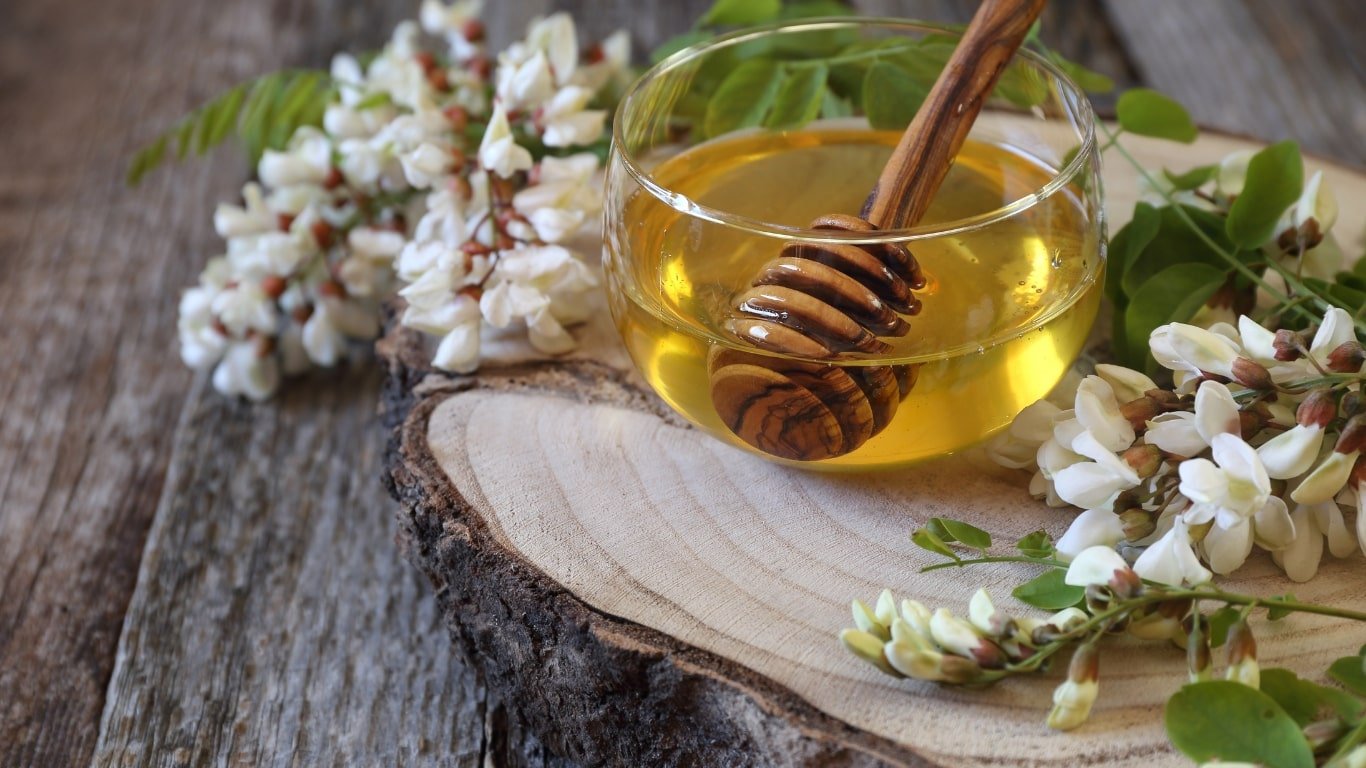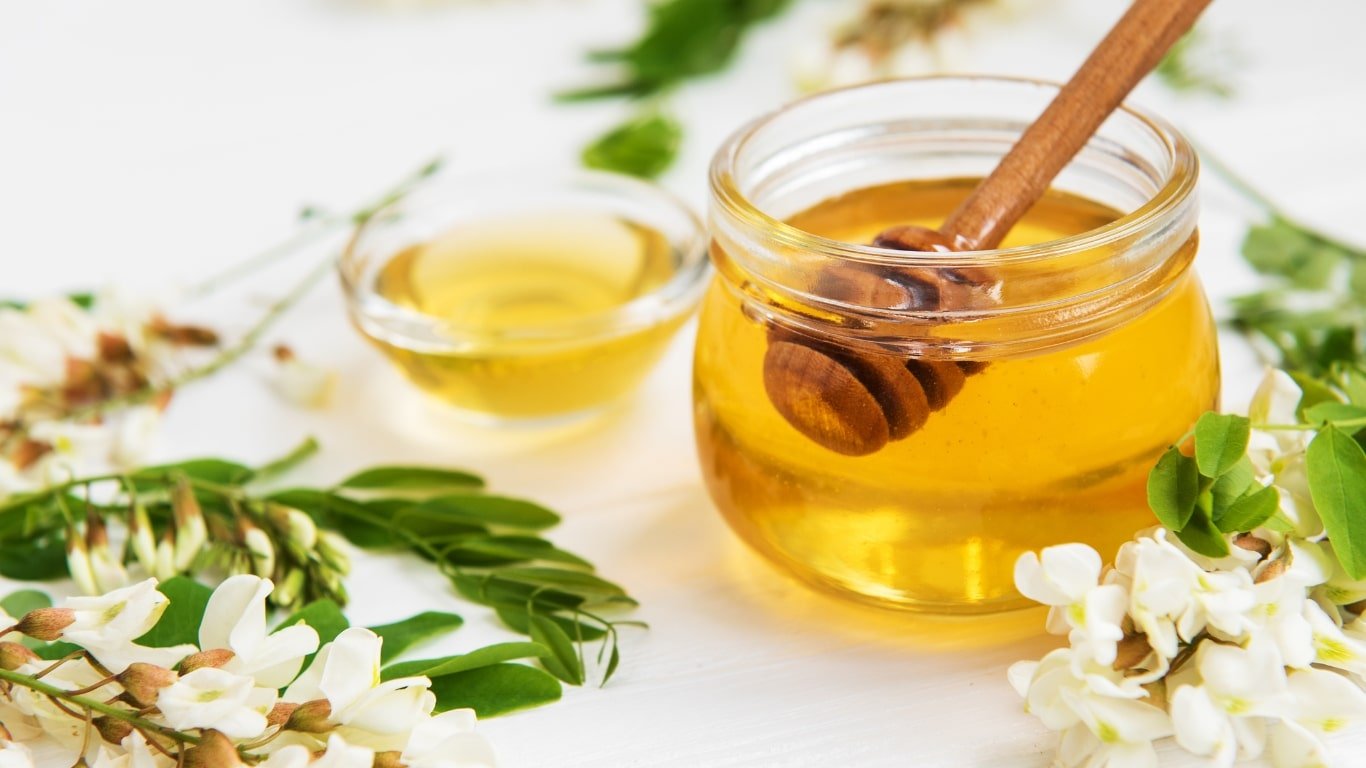
Introduction to Acacia Honey
Acacia honey is one of the most revered and sought-after varieties of honey globally, thanks to its light, delicate flavor, remarkable clarity, and host of health benefits. Derived from the nectar of the flowers of the black locust tree, also known as Robinia pseudoacacia, this honey is often labeled as “liquid gold” for its attractive appearance and many uses in culinary, medicinal, and cosmetic applications.
In this article, we will delve into the fascinating world of acacia honey, exploring its origins, nutritional profile, health benefits, and its many uses in daily life.
Origins and Production of Acacia Honey
Acacia honey is primarily produced in Europe, particularly in Hungary, Romania, and Bulgaria, as well as in parts of North America. The black locust tree, which produces the flowers from which this honey is harvested, blooms for a very short period—only a few weeks in late spring or early summer. This limited blooming window makes acacia honey a rare and premium product.
Beekeepers take advantage of this small window by placing their beehives near large groves of black locust trees during the flowering season. The bees collect the nectar from the fragrant white flowers and transform it into honey within the hive. Once the honey is collected, it is minimally processed, ensuring that the natural enzymes and beneficial compounds remain intact.
Nutritional Profile of Acacia Honey
Acacia honey stands out not only for its exquisite taste but also for its unique nutritional composition. Like other honey varieties, it is primarily composed of natural sugars such as fructose and glucose, which give it a mild sweetness. However, acacia honey has a higher fructose content compared to glucose, which gives it a slower crystallization rate and keeps it in liquid form for longer than other types of honey.
A typical tablespoon (21 grams) of acacia honey provides:
- Calories: 64
- Total Sugars: 17 grams
- Vitamins: Small amounts of vitamin C and B vitamins (B2, B3, B5, and B6)
- Minerals: Trace amounts of calcium, potassium, magnesium, and iron
- Antioxidants: Flavonoids and phenolic acids, which help protect the body against oxidative stress
Acacia honey also contains enzymes, amino acids, and other bioactive compounds, though in relatively small quantities. These components contribute to the health benefits associated with honey consumption.
Health Benefits of Acacia Honey
Acacia honey is celebrated not just for its delicate flavor but also for its numerous health benefits. Its unique composition makes it a valuable addition to a healthy lifestyle, supporting various aspects of physical and mental well-being.
1. Rich in Antioxidants
One of the standout features of acacia honey is its high antioxidant content. Antioxidants are compounds that help neutralize harmful free radicals in the body, reducing oxidative stress and lowering the risk of chronic diseases such as heart disease, diabetes, and cancer. The flavonoids and phenolic acids found in acacia honey are particularly potent, providing anti-inflammatory and anti-aging benefits.
2. Low Glycemic Index
Thanks to its high fructose content, acacia honey has a lower glycemic index (GI) compared to other types of honey, making it a better choice for those monitoring their blood sugar levels. Foods with a low GI are absorbed more slowly into the bloodstream, preventing rapid spikes and crashes in blood sugar. While acacia honey should still be consumed in moderation, it can be a better alternative to refined sugar for individuals with diabetes or those looking to manage their weight.
3. Promotes Digestive Health
Acacia honey has long been used as a natural remedy for digestive issues. It acts as a mild laxative, helping to ease constipation, and its antibacterial properties may help combat harmful bacteria in the gut. Moreover, honey is known for its prebiotic properties, meaning it can promote the growth of beneficial gut bacteria, contributing to a healthy and balanced digestive system.
4. Soothes Coughs and Sore Throats
Like many types of honey, acacia honey is commonly used as a natural remedy for soothing coughs and sore throats. Its smooth texture and antimicrobial properties make it an effective way to reduce irritation and promote healing. When mixed with warm water, tea, or lemon, acacia honey forms a soothing, coating layer that can help alleviate throat discomfort and reduce coughing.
5. Improves Skin Health
Acacia honey is a popular ingredient in skincare due to its gentle, non-irritating nature and its ability to hydrate, cleanse, and heal the skin. Its antimicrobial and anti-inflammatory properties make it beneficial for treating acne and minor skin infections, while its humectant nature helps draw moisture into the skin, keeping it soft and hydrated. Some people also use acacia honey as a natural remedy for dry, irritated skin or to treat minor wounds and burns, as honey’s antiseptic qualities can prevent infection and speed up healing.
6. Supports Mental Well-being
Acacia honey may also offer benefits for mental health. The antioxidants in honey can help reduce oxidative stress in the brain, potentially lowering the risk of neurodegenerative diseases like Alzheimer’s. Additionally, honey has been shown to have calming properties, which may help reduce anxiety and improve sleep quality. Incorporating a small amount of acacia honey into your diet could contribute to improved mood and cognitive function.
Culinary Uses of Acacia Honey

Acacia honey’s light, floral flavor and smooth texture make it an excellent ingredient in a variety of culinary applications. Unlike darker honeys, which can have a strong, overpowering taste, acacia honey pairs well with both sweet and savory dishes.
- Drizzled over Breakfast: Acacia honey is perfect for drizzling over pancakes, waffles, or toast, as it adds sweetness without overshadowing the other flavors. It also works well in oatmeal or yogurt bowls.
- In Beverages: Stir acacia honey into tea, coffee, or lemonade for a natural sweetener that dissolves easily and enhances flavor without being too intense. It’s also great in smoothies and shakes.
- Salad Dressings and Sauces: Use acacia honey in homemade salad dressings and marinades for a touch of sweetness and complexity. It works well in vinaigrettes or as a glaze for roasted vegetables, meats, or fish.
- Baking: Acacia honey can be used in baking as a natural substitute for sugar. Its mild flavor allows it to blend seamlessly into cakes, cookies, muffins, and bread.
- Cheese Pairings: Acacia honey is often enjoyed with cheese, particularly soft or mildly flavored cheeses like ricotta, brie, or goat cheese. It adds a touch of sweetness that complements the creaminess of the cheese.
Cosmetic Uses of Acacia Honey
In addition to its use in the kitchen, acacia honey is also valued in the beauty industry. Many cosmetic products incorporate honey due to its moisturizing, soothing, and antibacterial properties.
- Face Masks: Acacia honey can be used as a hydrating and cleansing face mask. Simply apply a thin layer of honey to your face, leave it on for 10–15 minutes, then rinse with warm water. It helps to soothe irritated skin and lock in moisture.
- Lip Balms: Acacia honey is often found in natural lip balms due to its ability to heal dry, cracked lips.
- Hair Care: Some people add acacia honey to their hair care routine to nourish and moisturize dry, damaged hair. It can be mixed with conditioner or applied as a hair mask for added hydration.
Acacia Honey Frequently Asked Questions
Is acacia honey better than normal honey?
Acacia honey is often considered better than regular honey for certain purposes due to its lighter flavor, higher fructose content, and slower crystallization rate. It’s also less likely to cause blood sugar spikes compared to other honey varieties, making it a preferred choice for those watching their sugar intake. However, whether it’s “better” depends on personal preference and specific health needs, as both acacia and regular honey offer similar antioxidant and antimicrobial benefits.
What are the side effects of acacia honey?
While acacia honey is generally safe for most people, it can cause allergic reactions in individuals sensitive to bee products. Like all honeys, acacia honey should not be given to infants under one year old due to the risk of botulism. Overconsumption may lead to weight gain or elevated blood sugar levels in people with diabetes if not taken in moderation.
What does acacia honey taste like?
Acacia honey has a mild, delicate, and floral taste, often described as less intense and less sweet than darker honeys like buckwheat or manuka. Its subtle flavor makes it an ideal sweetener for beverages, desserts, and dishes where a strong honey taste is not desired.
Is acacia honey good for a sore throat?
Yes, acacia honey is excellent for soothing a sore throat due to its smooth texture, antimicrobial properties, and ability to coat and relieve irritation. Its light flavor also makes it more palatable when used in warm teas or consumed directly for throat discomfort.
Does acacia honey spike blood sugar?
Acacia honey has a lower glycemic index compared to many other honeys, meaning it causes a slower and more gradual rise in blood sugar. While it may still affect blood sugar levels, its higher fructose content makes it a better option for people seeking to minimize spikes, though it should still be consumed in moderation.
Is acacia honey acidic?
Acacia honey, like other types of honey, is mildly acidic, with a pH ranging between 3.5 and 4.5. This acidity contributes to its antimicrobial properties, but it is not overly acidic and is generally well-tolerated by the stomach.
Which country has the best acacia honey?
Hungary is often regarded as producing some of the best acacia honey in the world due to the vast expanses of black locust trees, ideal climate conditions, and expertise in beekeeping. Romanian and Bulgarian acacia honey also rank highly in terms of quality and purity.
How much sugar is in acacia honey?
A tablespoon (about 21 grams) of acacia honey contains roughly 17 grams of natural sugars, primarily fructose and glucose. Its high fructose content gives it a lower glycemic index and contributes to its longer liquid state compared to other honeys.
Is acacia honey good for sleep?
Acacia honey can promote better sleep due to its natural sugars, which help maintain a steady blood sugar level overnight, potentially preventing sleep disturbances. Additionally, honey’s calming properties may aid in relaxation and improving overall sleep quality when taken before bed.
Acacia Honey Shop Singapore
If you’re looking to enjoy the rich, delicate flavor and numerous health benefits of acacia honey, look no further than our shop in Singapore. We offer premium, pure acacia honey sourced from the finest black locust trees, ensuring the highest quality and natural goodness in every jar. Whether you’re looking for a versatile sweetener, a natural remedy for sore throats, or a wholesome addition to your skincare routine, our acacia honey is the perfect choice. Shop with us today to experience the best acacia honey Singapore has to offer, delivered straight to your doorstep!
Conclusion
Acacia honey is more than just a natural sweetener; it’s a versatile and health-boosting ingredient that can be used in everything from your daily diet to your skincare routine. Its mild taste, slow crystallization, and rich antioxidant profile make it an excellent addition to any pantry. Whether you’re looking to improve your digestive health, soothe a sore throat, or add a touch of sweetness to your favorite dishes, acacia honey offers a range of benefits that make it a golden gift from nature.



